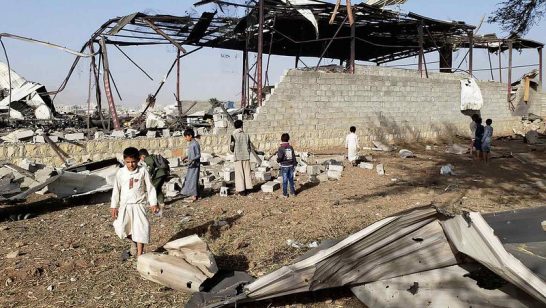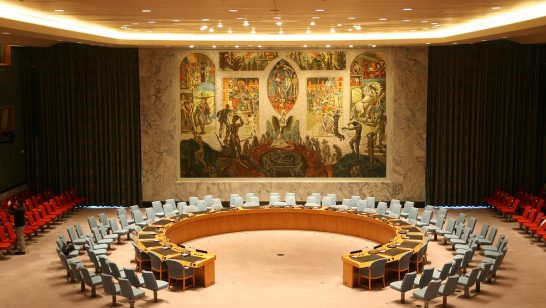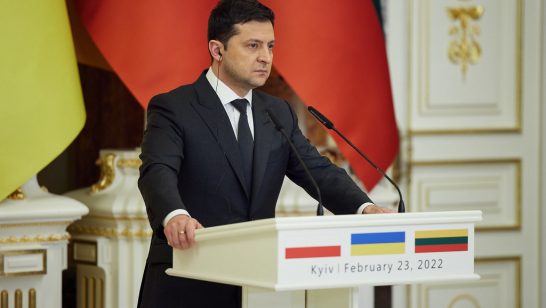
As the world grapples with the fallout of Russia’s invasion of Ukraine, the Doha Forum provided a chance to discuss it in a global gathering in a key Middle Eastern diplomatic hub. To understand the global responses to the war, it helps to see it from the perspectives of people in the Middle East: a region that has suffered multiple invasions and wars during the recent decades that Europeans too often portray as a long unbroken period of peace.
Ukrainian president Volodymyr Zelensky gave a surprise video address at the opening session, urging Gulf countries to supply more oil and gas to make the world market less dependent on Russian energy. Appearing in person, Ukraine’s deputy foreign minister Emine Dzhaparova spoke powerfully.
The warm welcome given to the Ukrainian speakers in Doha contrasted with the approach of some of the other Gulf states, who have been markedly reluctant to take sides. Indeed, the US should be worried that its traditional partners and allies in the Middle East are mostly sitting on the fence when it comes to the invasion of Ukraine, even as the Europeans consider it to be an era-defining watershed.
Few countries in the Middle East want a new Cold War. They’re more comfortable with a multipolar world, where they can hedge their bets and gain different kinds of support from different big powers. Jane Kinninmont
Few countries in the Middle East want a new Cold War. They’re more comfortable with a multipolar world, where they can hedge their bets and gain different kinds of support from different big powers: the US for security against state threats and terrorism, China for infrastructure investment and new trade routes, Russia for oil-price cooperation and assistance with some very targeted security concerns (maintaining Israel’s ability to bomb Hizbollah supply lines in Syria, potentially exerting influence over Iran, etc).
This shopping-list approach is more comfortable than total dependence on any one big power. It’s also useful from their point of view to be able to play big powers off against each other.
The irony is that the small Arab states of the Persian Gulf – like Qatar – have good reasons to fear a world where big states can march into their smaller neighbours. They’ve seen it themselves: Russia’s invasion of Ukraine has many parallels with Iraq’s 1990 invasion of Kuwait – which was preceded by Saddam Hussein’s denials that Kuwait was ever a real country. Kuwait was not in NATO, but the US and UK led a coalition to liberate it, with UN authorisation. Not coincidentally, when it comes to the invasion of Ukraine, Kuwait has taken the clearest and most principled approach in support of international law and against aggression.
While Qatar’s experience is nowhere near comparable to the severity of Kuwait’s, Qatar has its own reasons why it might sympathise with a country under pressure from larger neighbours who insist its foreign policy must fall into line with theirs. In 2017 its neighbours placed it under sanctions which they said would end only if it agreed to 13 demands, which included aligning itself with them politically, cutting links with Iran and Turkey, and closing the broadcaster Al Jazeera. There were even unconfirmed claims that the US had staved off a possible invasion by Saudi Arabia and the UAE. Rather than meeting the demands, Qatar strengthened its alliances outside the region with the help of its immense wealth and natural gas exports and fast-tracked plans for a small Turkish military base (though Al Jazeera became a bit nicer to Saudi Arabia). This year it has been announced as a major non-NATO ally of the US. (Last year, an agreement was reached to re-establish relations between Qatar and the other Gulf Cooperation Council (GCC) states and the rift was largely glossed over at the Forum.)
So the question of exactly what security commitments the US is willing to make outside of NATO – which is being tested right now in Ukraine – is deeply relevant to the Gulf states’ own existential concerns.
The US has been seen as the underwriter of Gulf security since the Iranian revolution, which prompted the 1980 “Carter Doctrine” that “An attempt by any outside force to gain control of the Persian Gulf region” would be regarded as an attack on US interests and would be repelled. Subsequently, the liberation of Kuwait set the bar for what were largely informal assumptions and understandings about US willingness to defend countries in the region. But today these assumptions are being questioned. As a result, some Gulf states are now seeking formal, written security guarantees from the US, possibly in the form of a defence treaty, although Congressional approval may be complicated to obtain.
As the desire for a more formalised security relationship indicates, the Gulf states and Israel continue to need the US more than any other power, both for direct security support (weapons, training, technology) and for its leadership of regional security efforts (such as maritime security in the Gulf and increasingly in the Red Sea and Gulf of Aden). The presence of US military bases in most Gulf states acts as an added deterrent to would-be invaders, even as Iran sees the bases as an intrusion or even a provocation.
But the desire to formalise also reflects the fact that long-term trends in US politics (and, to some extent, the energy transition) have led many in the Gulf to question the extent to which the US really will underwrite their security against the threats they see. The Gulf states look at the last three presidents and see a consistent trend of the US becoming more isolationist in general, less committed to allies, and more interested in the Asia-Pacific than the Middle East.
Moreover, GCC and US views on some of the key regional security challenges have diverged substantially: from the 2003 US-led invasion of Iraq to the JCPOA with Iran and the post-2011 waves of social and political upheaval within states. The UAE and Saudi leaders preferred Trump to either Obama or Biden, given his stance on the JCPOA and overt lack of interest in human rights. But he too disappointed them with the limited US response when Saudi Arabia’s main oil refinery was attacked in 2019 with missiles attributed to Iran. If the discussions about formal security guarantees leads nowhere, it may sour things further.
The US’s domestic polarisation has also weakened its international credibility. Many in the region share the view that Biden may be a one-term president, and that US policy may again flip-flop along partisan lines. The recent tone of US politics has sent the deeply counterproductive message that if the Gulf states alienate the current president, they may find their fortunes reversed by the next one, who might even welcome the ability to say “Biden lost these guys, and I am bringing them back onboard”.
So the irony is that leaders in this part of the world, which itself needs international underwriting of the legal and political norms of state sovereignty, seem to be thinking less of how to protect those laws and norms for everyone, and more of how to ensure they themselves have the right people on their side to defend them if they come under attack.
In this context, an international order that upholds state sovereignty is important but is hardly seen as totally assured.
Widen the lens further to the broader Middle East – to the invasion of Iraq, the Israeli-Palestinian conflict, the internationalised civil wars in Syria and Libya with multiple foreign countries intervening – and you can see why the “rules-based international order” is not a flag many can rally around.
Various Syrian and Libyan speakers emphasised their solidarity with Ukraine as they know firsthand what Russian intervention has been like in their own countries. “We are NATO’s southern flank”, said a speaker from Libya, on a panel where some debated whether the Ukraine war would prompt Russia to turn up the heat in Libya, or instead constrain its bandwidth to do so.
But, at the same time, there was a recurring theme: what about us, why didn’t the world care as much when we died, or when we had to flee our countries or faced chemical weapons? Why is there such a vast gap between the sanctions on Russia and the policies of numerous US states to make it illegal for companies to choose to boycott Israeli settlements? A number of crass comments about “blue eyed refugees”, “people like us” and so on – sometimes from officials, or often from TV talking heads – have generated anger around the world, especially alongside reports of African refugees from Ukraine facing racist discrimination.
The global economic effects of both the invasion and the sanctions are also alarming countries in the global south, especially those already facing famine and acute hunger. Egypt, Ethiopia and Lebanon are among those most directly affected.
Hina Rabbani Khar – who has subsequently been appointed as Pakistan’s minister of state for foreign affairs – put it bluntly: “Our lives seem to be worth less”. Ibrahim Kalin, an advisor to the Turkish president, condemned the Russian invasion but said that the roots of the crisis included the “power disequilibrium for the last three decades” in global politics.
The perception that international law is not fairly applied has become a strategic problem for European and US efforts to build solidarity with Ukraine. One simple thing Europeans can do now is to move on from talk of “Western values”, which sound weirdly parochial, exclusionary and patronising in the wider world. Instead, the rallying points should be human security, international law and the principles of the UN charter – an inclusive, fair, and global approach.
The opinions articulated above represent the views of the signatories and do not necessarily reflect the position of the European Leadership Network or the entirety of its membership. The ELN’s aim is to encourage debates that will help develop Europe’s capacity to address the pressing foreign, defence, and security policy challenges of our time.
Image: Flickr, MFA of Poland.
.



